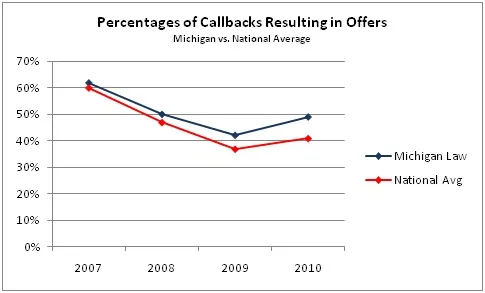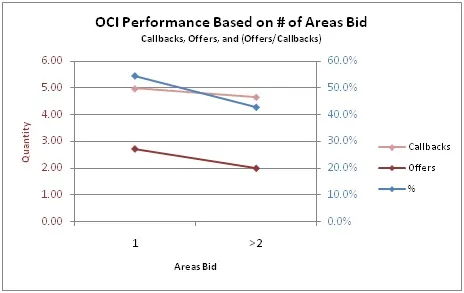Careers, callbacks, and other customs
I recently saw some data that made me happy, showing how much better Michigan Law students fare in the ratio of offers-to-callbacks following on-campus interviews than the national data compiled by the National Association for Law Placement. On the one hand you may think—well, big deal. Michigan ought to be doing better than most law schools, right? But remember, we’re not talking about Michigan versus all schools, and we’re not even talking about how many people get callbacks after an on-campus interview. The relevant starting point is law schools where firms go for on-campus interviewing in the first place—itself a fairly select group—and, from there, which of the people who got callbacks—i.e., people who survived one level of vetting by the firm in question—ended up with employment offers. Among that rarefied crowd, doing at all better strikes me as not for nothing. And the Michigan Law difference has actually been increasing in the context of a tough economy:

What accounts for the above-average performance? Well, obviously, most credit goes to Admissions, for admitting brilliant and pleasant people. (“Most credit goes to Admissions” is, I think, a safe general rule of thumb whenever something goes well.) I guess some credit can also plausibly go to people’s parents. But beyond that … well, probably some bit of credit should also go to the Office of Career Planning, which houses a lot of career-advising talent and experience. At this time of year—specifically, the about-to-be on-campus-interviewing time of year—their help is invaluable.
Now, students aren’t always sure that this is true. We read lots of criticisms in the blogosphere about what law schools aren’t doing to help law students get jobs—and, frankly, if there is even one law graduate who wants a job who can’t get one, it is hard for any career counselor not to feel like he or she should/could be doing more to help. And it is even easier for the person who isn’t getting a job to feel that way.
This sensibility isn’t just a creation of the New Economy. I happened, earlier in the summer, to be looking at archives of the Res Gestae, the Law School’s student newspaper, from the era when I was a student. (I was trying to hunt down an article that I remembered as being totally hilarious teasing of the Law Library’s incomparable director, Margaret Leary, who retired this summer, thinking it would be fun to trot it out two decades later on the occasion of her exodus. Sadly, when I found the article, it seemed to have aged poorly, and was no longer very funny at all. Arguably, it is I who has aged poorly, the victim of a calcifying sense of humor. But I chalked it up to autres temps, autres moeurs.) That era was, like now, a particularly challenging economic period; the year I graduated, 1992, had, until recently, the worst legal employment statistics of any year since World War II. And I was interested to see the RG had a couple of articles criticizing the then-Office of Career Services, in ways that were remarkably similar to the criticisms one frequently sees in every article or blog about current legal employment. Plus ça change, plus c’est la même chose?
But I can more or less prove that our OCP helps, thanks again to data. If you go to a career counselor, you are 13% more likely to receive an offer out of the on-campus interviewing experience; and on top of that, on average, you will get almost a full offer more when you do. That data ought to resonate: Some students will argue that “biglaw” hiring is all about the grades, but in fact, there are real and important steps you can take to improve the likelihood you’ll take an offer. (The same is true in the admissions world; applicants are convinced that admissions is all about the LSAT and UGPA; I presume those are the applicants with typos in the first sentences of their personal statements.)
Even very straightforward career counseling—advice that can sometimes seem obvious to those of us who have been familiar with the legal job market for a while—can be new and useful to people who are seeking their first law school jobs. Here’s my example: It is a conventional bit of wisdom in OCP that interviewing in multiple cities carries risks, and counselors therefore frequently urge people to be cautious in pursuing that course; standard counseling explores those costs and benefits. Now, this often strikes students as counterintuitive; to them, the more cities in which you’re willing to live, the more firms you can interview with—the more firms you interview with, the more chances you have of getting an offer. In fact, though, less is truly sometimes more. If you narrow your list and focus your search, you do a better job of preparing for each interview. If you can credibly say, “I’m looking only at firms in your city,” you are more convincing to employers that you want their job. And people prefer to hire people who want the job; that plays a far bigger role in the decision to hire someone than you would possibly imagine if you’d never been in a position of hiring anyone.
Perhaps you are unwilling to take my word for it—after all, conventional wisdom is often factually incorrect. For example, conventional wisdom would probably hold that one shouldn’t insert foreign colloquialisms into everyday writing, but you know what they say: “Other days, other customs.” Plus, I have yet more data! The data we have from an analysis of last year’s on-campus interviewing show that interviewing in two markets rather than one can have some negative impact on your outcome—and you see real drama if you look at the data for interviewing in three markets and up:

So: get that Michigan edge and go see your career counselor, and you will walk into your interviews with confidence. After all, aide-toi, le ciel t’aidera!
-Dean Z.
Assistant Dean for Admissions
and Special Counsel for Professional Strategies
